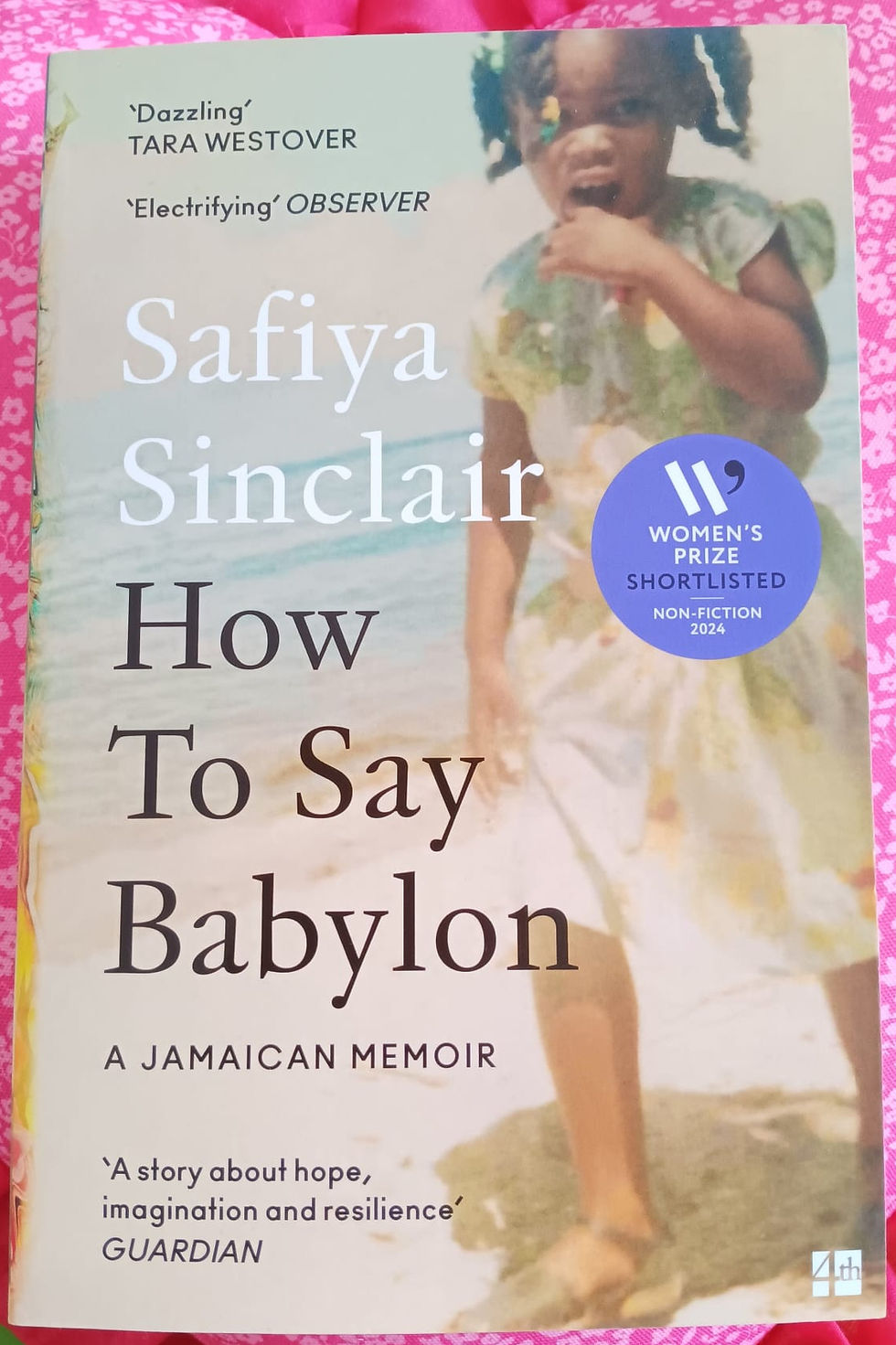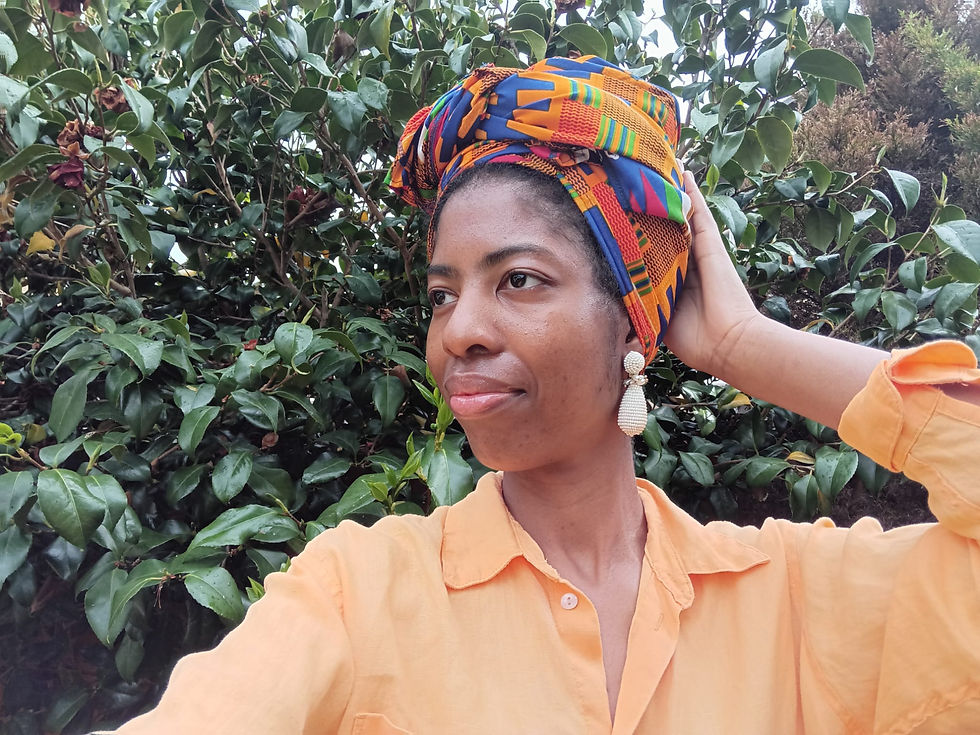PLAY REVIEW: SHIFTERS BY BENEDICT LOMBE
- booksandjoyfulness
- Sep 8, 2024
- 7 min read
Play Review – Shifters by Benedict Lombe
“Love liberates. It doesn’t bind.” – Maya Angelou
“Have enough courage to trust love one more time and always one more time.” – Maya Angelou.

Introduction:
I have a deep and enduring love for stories. Stories (whether in the form of a novel, television series, film or play) have the power to move us, to open our eyes to new perspectives and make us ponder over multiple interpretations. Stories can lead to fierce debates and can increase empathy.
A few days ago, I had the privilege of going to see the play, ‘Shifters’ written by Benedict Lombe and directed by Lynette Linton at the Duke of York’s Theatre. This play stars Heather Agyepong and Tosin Cole. ‘Shifters’ is about characters Des (Heather Agyepong) and Dre (Tosin Cole) and their reunion under sad circumstances. ‘Shifters’ is described on the theatre programme as a “fierce new romance”, and I certainly agree but I feel that what these characters share is deeper than romance.
Romance in my opinion, can be fun and enjoyable, but romance can be shallow. Romance is sweet but it is just that - the sweet icing on top of the cake. Romance says sweet words and provides pretty gifts to be posted on social media. True love (in any form – not just romantic love) is an ocean of care, appreciation and understanding. True love lies in everyday actions. True love is on a constant quest to care for others whist maintaining boundaries of Self.
In my view, deep love is built on a deep canyon-wide understanding and appreciation for each other – including our flaws. The love shared between the characters Des and Dre in the play ‘Shifters’ is deeper than just a ‘cutesy’, ‘demure’ Disney romance (shout out to Jools Lebron and her amazing catchphrases!) This play is about a love that has been ravaged by trauma and tie-dyed by tragedy; yet these characters seem to always return to each other in some way or another. In the beginning of the play, the characters have a debate about love. Des suggests that love can be uncomplicated, and Dre appears to argue that pain is a part of love.
He even points out the lyrics of the well known Lionel Ritchie song, ‘Easy’
“Know it sounds funny
But I just can’t stand the pain
Girl I’m leaving you tomorrow [.]”
(I’m sure the nature of love and its ingredients will be an ongoing debate amongst many millennials and generations to come.)
‘Shifters’ is about many things. Fundamentally, it is about the constant shift (or push and pull) between the characters Des and Dre and their different philosophical perspectives which we see in action when they first meet in a debate class in Sixth Form. Des believes that there are multiple sides to arguments and choices we can take. She doesn’t really believe in fate. Dre, however, believes that we don’t have as much choice as we think. He feels one is either ‘for’ or ‘against’ in a debate – that there are simply two sides to an argument. The play is anchored on their opposing views as they dance and shift around each other throughout the play just as Earth travels around the Sun, always returning to its rightful place to begin the yearly pattern again.
I will focus on three aspects of this performance that I really enjoyed and found to be effective in reinforcing the concept of shifting.
Staging and lighting:
The staging, set design and lighting were excellent. The stage was rectangular and sat in the centre of the theatre. People sitting near the stage sat around sides of the stage shifting their gaze from one character to the next, almost in the way people view tennis matches, thus creating a sense of community theatre where theatre goers can be immersed in the story. The story isn’t simply taking place from a stage high up and away from the audience. The story is not removed from the audience, but instead placed almost right in the centre. In my view, this is a way of saying ‘you are part of the story; this is your story, too.’ In a way, I think the audience were the third and fourth characters of the story as we watched, laughed and gasped. The sound design evoked feelings of love and longing and accompanied the romantic and sexual tension that existed between the characters. Des and Dre played us well known African songs from their phones (the songs were from Nigeria and the Democratic Republic of the Congo) which made some of us sway rhythmically in our seats. The soundtrack moved to the storyline, changing at important moments. Audience reactions acted as another soundtrack to the story.
Even though the fourth wall was never broken, I certainly felt involved and a part of the telling of this story. I think this style of staging created a sense of community theatre even for those sitting in the Royal and Upper Circles, as we were able to look down and witness the stage being near the people. The stage was mostly bare, except for when Dre brought in boxes filled with memorabilia relating to the past which the characters used from time to time to aid story telling. The stage lighting was expertly executed. Blue and orange lighting was used to light up the stage and surroundings, most noticeably above the characters’ heads, often to signify a change in scene or time which I found to be very effective. I liked that the stage was bare. I enjoy when writers and characters make viewers work for the visualisation of the story by using our imaginations. Although staging and lighting were used heavily to tell the story and characters described their surroundings, particularly Dre during the beginning scene of his Grandmother’s funeral, the audience still had to significantly use their imagination. In literature, I’m also a fan of describing characters’ thoughts and emotions slightly more than their physical surroundings. There was no need for chairs and tables on stage. We saw the story mostly through the characters’ dialogues. I will discuss this further in my section on characterisation.
The tension between definitive vs multiple outcomes:
In ‘Shifters’, Dre appears to have the belief that you are either ‘for’ or ‘against’ a proposition as is evidenced through his first interactions with Des during a debate lesson whereas Des declares her belief in multiple outcomes. This debate and these diametrically opposing views seem to form the basis of their clashes and attraction to each other and are evidenced through their constant dialogue, which showcases the constant push and pull that exists between them. As audience members, we delight in the way the dialogue shifts between their differing views. When Des moves away to pursue her career, only returning years later to Dre’s Grandmother’s funeral, it appears Dre sees this as fate and makes his feelings very clear as the story progresses. When asked, Des confirms that she does love her current partner. Perhaps, due to Des’ beliefs, she may feel that it’s possible to love more than one person at a time or that you can love many people in different ways.
Des and Dre tease and challenge each other’s viewpoints, yet their teasing is clearly underpinned by a deep affection and appreciation for each other’s differences. Although both characters are different, perhaps their teasing of each other’s views challenges them to reconsider their stances. At the end of the play, Dre makes a decision that appears to show his acceptances of multiple outcomes and the acceptance that many things can be true at once – that Des can love both him and someone else. Des appears to make a final decision that suggests an understanding that it is possible that fate exists, and that sometimes circumstances are created for us. This play invites us as audience members to watch how both characters ‘shift’ and tilt even if ever so slightly, from their respective axes. I loved the way that these characters literally shifted and danced around each other on stage, often stepping over to the other ‘side’. Perhaps the debate of ‘for’ or ‘against’ vs multiple outcomes isn’t so simple after all. Perhaps, there is no resolute answer.
Characterisation:
Dre has faced significant trauma and is characterised as a young man who uses humour to mask his deep internal pain. Dre is deeply sensitive and yearns to be loved. This is shown through his tone of voice, his dialogue and his actions. Dre speaks in melodic tones and shows much tenderness towards Des, particularly when he hugs her after a panic attack. Des is also very loving even though she can be very guarded, likely due to her own trauma. During a period in the past when they appear to be in a relationship, she helps Dre untangle his hair after he uses a hair product. He sits in front of her as she helps detangle his hair in act that many in the Black community will recognise as a significant act of love and care. One the other hand, the image of Dre sitting between Des’ legs and Dre asking for kisses may have been a prelude to sexual intimacy. I must note that the connection felt between these two characters both in this scene and other romantic scenes shows strong Movement and Intimacy Direction. These characters can use their bodies to show enduring love, lust and affection for each other. Des affirms Dre as being “enough” and says of his son in the penultimate scene, nothing created by Dre could ever be less than perfect. Both characters use very open body language and as noted earlier, shift between each other on stage, signifying difference yet a willingness to inhabit each other’s ‘worlds.’
Their dialogue is critical to their characterisation. Dre talks in detail about his childhood pain as does Des and we see their differing views through their constant, witty back and forth which is a clear representation of Benedict Lombe’s exceptional playwriting skills. Through dialogue, we see characters’ true feelings, even when they don’t verbalise them. When Des tells Dre about her fiancée, Dre’s words and vocal sounds attempt to communicate humour, nonchalance and light-hearted banter, but we as audience members know better. Their opposing views and love for each other are maintained and reinforced through their clear, crisp and unflinching dialogue.
Conclusion:
Like Earth moving around the sun, these characters return to each other again and again. Although the end of the play is somewhat ambiguous, it is clear that these characters will always be in each other’s lives and/or minds in some way or another. The staging and lighting, underpinning debate and opposing philosophies and characterisation mix together to create a play that is unmistakably profound. As for the question of ‘for’ or ‘against’ vs multiple outcomes to propositions and ideas about fate and choices, I think the answer lies in case-by-case situations, propositions, circumstances and arguments. There is truth in both Dre and Des’ perspectives. I am certain that Lynette Lynton will continue to direct and create art that moves and astounds. A must watch. Ends soon.
The script for the play ‘Shifters’ is available on Amazon, here.
Please share widely. Review services available: literary reviews, academic books or article reviews e.g. legal and theological.
Review written by Afia Nicholas, published 9th September 2024.




Comments